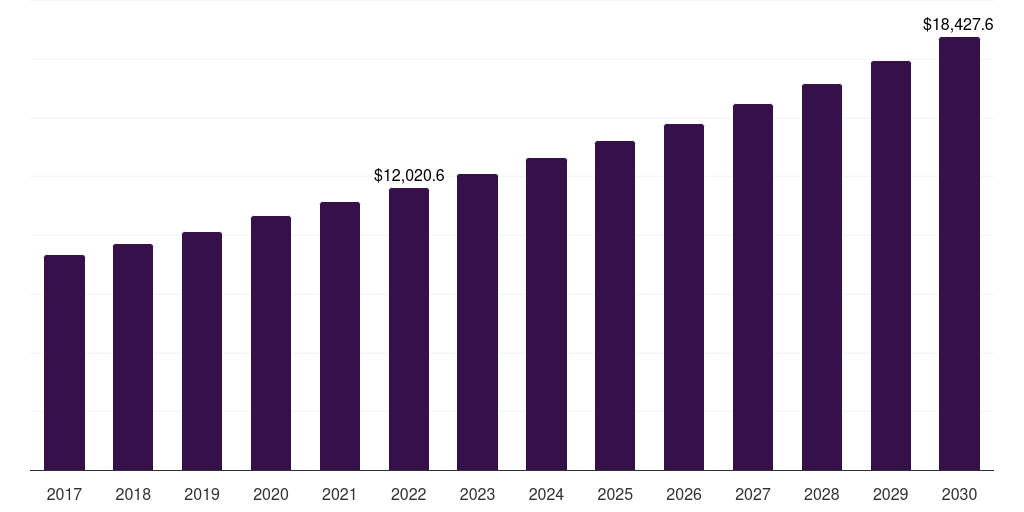Asia Pacific Bar Soap Market Size & Outlook, 2022-2030
Related Markets
Asia Pacific bar soap market highlights
- The Asia Pacific bar soap market generated a revenue of USD 12,020.6 million in 2022.
- The market is expected to grow at a CAGR of 5.5% from 2023 to 2030.
- In terms of segment, synthetic was the largest revenue generating type in 2022.
- Organic is the most lucrative type segment registering the fastest growth during the forecast period.
- Country-wise, India is expected to register the highest CAGR from 2023 to 2030.
Asia Pacific data book summary
| Market revenue in 2022 | USD 12,020.6 million |
| Market revenue in 2030 | USD 18,427.6 million |
| Growth rate | 5.5% (CAGR from 2022 to 2030) |
| Largest segment | Synthetic |
| Fastest growing segment | Organic |
| Historical data covered | 2017 - 2021 |
| Base year for estimation | 2022 |
| Forecast period covered | 2023 - 2030 |
| Quantitative units | Revenue in USD million |
| Market segmentation | Organic, Synthetic |
| Key market players worldwide | Unilever PLC, Natura &Co Holding SA ADR, Johnson & Johnson, Colgate-Palmolive Co, Lush Retail Environments, Ethique, Chagrin Valley Soap & Salve, Galderma, Dr. Bronner's |
Other key industry trends
- In terms of revenue, Asia Pacific region accounted for 39.9% of the global bar soap market in 2022.
- Globally, Asia Pacific is projected to lead the regional market in terms of revenue in 2030.
- Asia Pacific is the fastest growing regional market and is projected to reach USD 18,427.6 million by 2030.
Synthetic was the largest segment with a revenue share of 92.73% in 2022. Horizon Databook has segmented the Asia Pacific bar soap market based on organic, synthetic covering the revenue growth of each sub-segment from 2017 to 2030.
With growing global environmental consciousness, many consumers in Asia seek sustainable and ecofriendly alternatives. As a result, beauty brands across the region are incorporating a wide range of natural ingredients in bar soaps, like green tea, ginseng, rice, aloe vera, and various botanical extracts to cater to the demand for more sustainable and holistic beauty options.
For example, Unilever’s Indian headquarters is involved in formulating beauty products that consist of natural ingredients. Also, L’Oreal is engaged in its L’Oreal Innovation Runway, allowing beauty industry start-ups a platform to create sustainable and environmentally friendly products.
Formulations like apple cider vinegar, onion seed oil, and other Ayurvedic options have created a demand for natural alternatives over synthetic ones. Also, bar soap companies are providing handcrafted bar soaps in different quantities to gain a wider consumer base.
No credit card required*
Horizon in a snapshot
- 30K+ Global Market Reports
- 120K+ Country Reports
- 1.2M+ Market Statistics
- 200K+ Company Profiles
- Industry insights and more
Bar Soap Market Scope
Bar Soap Market Companies
| Name | Profile | # Employees | HQ | Website |
|---|---|---|---|---|
| Dr. Bronner's | View profile | 11-50 | Escondido, California, United States, North America | https://www.drbronner.com |
| Galderma | View profile | 10001+ | Lausanne, Vaud, Switzerland, Europe | http://www.galderma.com |
| Chagrin Valley Soap & Salve | View profile | 1-10 | Cleveland, Ohio, United States, North America | https://www.chagrinvalleysoapandsalve.com |
| Ethique | View profile | 1-10 | Christchurch, Canterbury, New Zealand, Oceania | https://ethique.com |
| Lush Retail Environments | View profile | 11-50 | San Diego, California, United States, North America | https://lushretail.com |
| Natura &Co Holding SA ADR | View profile | 19955 | Avenida Alexandre Colares, No. 1188, Sala A17-Bloco A, Parque Anhanguera, Sao Paulo, SP, Brazil, 05106-000 | https://ri.naturaeco.com |
| Colgate-Palmolive Co | View profile | 34000 | 300 Park Avenue, New York, NY, United States, 10022 | https://www.colgatepalmolive.com |
| Unilever PLC | View profile | 128377 | 100 Victoria Embankment, London, United Kingdom, EC4Y 0DY | https://www.unilever.com |
| Johnson & Johnson | View profile | 134400 | One Johnson and Johnson Plaza, New Brunswick, NJ, United States, 08933 | https://www.jnj.com |
Asia Pacific bar soap market size, by country, 2017-2030 (US$M)
Asia Pacific Bar Soap Market Outlook Share, 2022 & 2030 (US$M)
Related industry reports
Related statistics
Sign up - it's easy, and free!
Sign up and get instant basic access to databook, upgrade
when ready, or enjoy our
free plan indefinitely.
Included in Horizon account
- 30K+ Global Market Reports
- 120K+ Country Reports
- 1.2M+ Market Statistics
- 200K+ Company Profiles
- Industry insights and more



